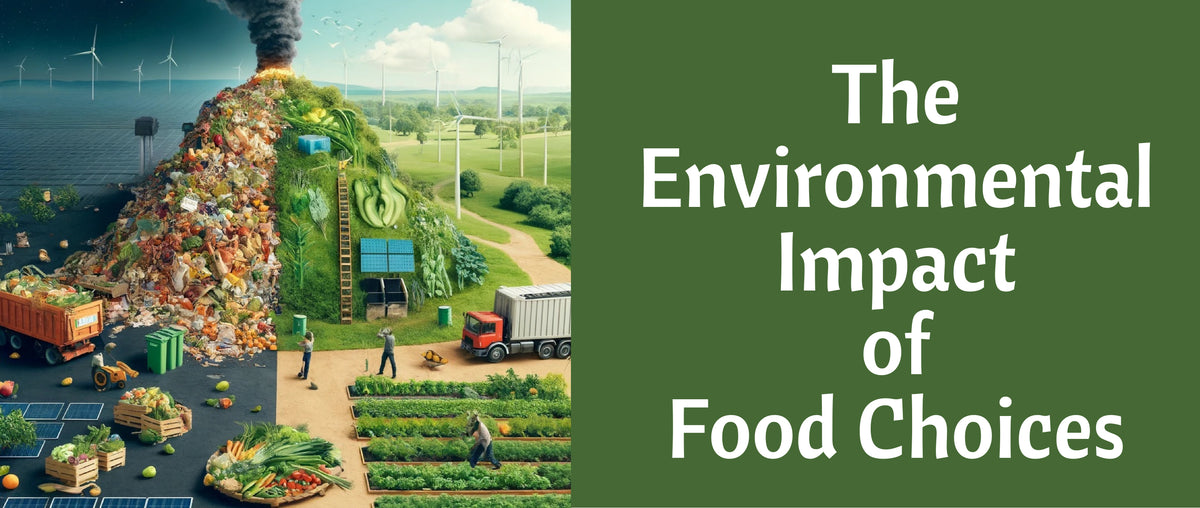The Environmental Impact of Food Choices
Sustainable food choices consider environmental impact, reducing greenhouse gases, deforestation, and water use to benefit the planet's health.
The food choices we make daily have profound impacts on the environment. From greenhouse gas emissions to deforestation and water usage, our diets play a significant role in climate change. Understanding these impacts and making informed choices can help mitigate environmental damage and promote sustainability.
Understanding the Environmental Impact of Food Production
Food production is a major driver of environmental degradation. The agricultural sector is responsible for approximately 37% of global greenhouse gas emissions. The primary contributors are methane emissions from livestock and rice production, nitrous oxide from fertilizers, and carbon dioxide from deforestation and land-use changes.
Greenhouse Gas Emissions
Livestock Farming
Livestock, particularly cattle, produce methane through enteric fermentation, which is a potent greenhouse gas.
Crop Production
The production of feed crops for livestock also contributes significantly to emissions, as does the use of synthetic fertilizers.
Environmental Costs
Deforestation
Large swaths of forests are cleared to create space for agriculture, particularly for cattle ranching and soy production.
Water Usage
Agriculture is the largest consumer of freshwater resources, with a significant portion used for irrigation.
Food and Climate Change
Food systems are intricately linked to climate change. The way we produce, process, distribute, and consume food affects the planet's climate.
Contribution to Climate Change
- Food systems account for up to 37% of global greenhouse gas emissions.
- Livestock production is particularly harmful due to methane emissions and the need for vast amounts of feed crops.
Mitigation Strategies
- Shifting to plant based diet can reduce emissions significantly.
- Reducing food waste can also lower the overall environmental footprint of food systems.
The Role of Agriculture in Climate Change
Agriculture is a critical area for climate change mitigation. Practices in livestock farming and crop production have substantial environmental impacts.
Livestock Farming
- Methane Emissions: Livestock produce methane, a greenhouse gas 25 times more potent than carbon dioxide over a 100-year period.
- Land Use: Large areas of land are dedicated to grazing and growing feed crops, leading to deforestation and habitat loss.
Crop Production
- Fertilizer Use: The use of synthetic fertilizers releases nitrous oxide, another potent greenhouse gas.
- Water Consumption: Irrigation for crops consumes large amounts of freshwater, leading to depletion of water resources.

Benefits of Plant-Based Diets
Shifting to plant-based diets can have numerous environmental and health benefits.
Environmental Benefits
- Reduced Emissions: Plant-based diets result in lower greenhouse gas emissions compared to diets high in animal products.
- Resource Efficiency: Growing plants for direct human consumption is more efficient than growing feed for livestock.
Health Benefits
- Healthy Diet: Plant-based diets are rich in nutrients and can lower the risk of chronic diseases such as heart disease, diabetes, and cancer.
- Weight Management: Such diets can also aid in weight management and overall well-being.
Food Waste and Its Environmental Impact
Food waste is a critical issue that exacerbates environmental problems.
Global Statistics
- Approximately one-third of all food produced is wasted, amounting to about 1.3 billion tons per year.
- Food waste contributes significantly to greenhouse gas emissions, as decomposing organic matter releases methane.
Reduction Strategies
- Consumer Behavior: Encouraging consumers to buy only what they need and use leftovers can significantly reduce waste.
- Supply Chain Improvements: Enhancing storage, transportation, and distribution systems can minimize food loss.
How Diets Need to Change to Meet Climate Targets
Achieving climate targets requires significant changes in our diets.
Dietary Changes
- Increase Plant-Based Foods: Doubling the consumption of fruits, vegetables, legumes, and nuts.
- Reduce Meat and Sugar: Halving the intake of red meat and foods with added sugars.
Expert Recommendations
- Balanced Diet: A balanced diet that includes a variety of plant-based foods can help meet nutritional needs while reducing environmental impact.
- Policy Support: Policies that promote sustainable dietary practices are crucial for achieving climate goals.
Sustainable Food Practices
Adopting sustainable food practices can mitigate the environmental impact of food production.
Farming Practices
Regenerative Agriculture
Practices that restore soil health, such as crop rotation and organic farming.
Agroforestry
Integrating trees and shrubs into agricultural landscapes to enhance biodiversity and sequester carbon.
Technological Innovations
Precision Agriculture
Using technology to optimize field-level management regarding crop farming.
Vertical Farming
Growing crops in vertically stacked layers to reduce land use and improve efficiency.
What Can You Do?
Individuals can make a significant impact by adopting sustainable dietary habits.
Practical Steps
- Eat More Plants: Incorporate more fruits, vegetables, and legumes into your diet.
- Reduce Meat Consumption: Limit the intake of red and processed meats.
- Avoid Food Waste: Plan meals, store food properly, and use leftovers creatively.
Healthy Eating
- Healthy Snacks for Kids: Offer snacks like fruits, vegetables, and whole grains.
- Healthy Drinks: Choose beverages like water, herbal teas, and kombucha over sugary drinks.
Policy Recommendations for Sustainable Food Systems
Policies play a vital role in promoting sustainable food systems.
National Initiatives
- Subsidies and Incentives: Provide financial support for sustainable farming practices.
- Regulations: Implement regulations that limit harmful agricultural practices and promote sustainability.
International Cooperation
- Global Agreements: Support international agreements like the Paris Agreement that set targets for reducing greenhouse gas emissions.
- Knowledge Sharing: Facilitate the exchange of knowledge and best practices between countries.
Case Studies: Successful Implementations
Examining successful implementations can provide valuable insights into effective strategies.
Country Examples
- Denmark: Policies promoting organic farming and reducing food waste have made significant progress.
- Netherlands: Advanced agricultural technology and practices have made Dutch agriculture highly efficient and sustainable.
Conclusion
The choices we make about the food we eat have far-reaching impacts on the environment. By understanding these impacts and making informed decisions, we can contribute to a more sustainable and healthy future. Policymakers, businesses, and individuals all have a role to play in transforming our food systems for the better.
Do you enjoy vegan food? We have a list of vegan restaurants in India to help you find delicious options in your area!










